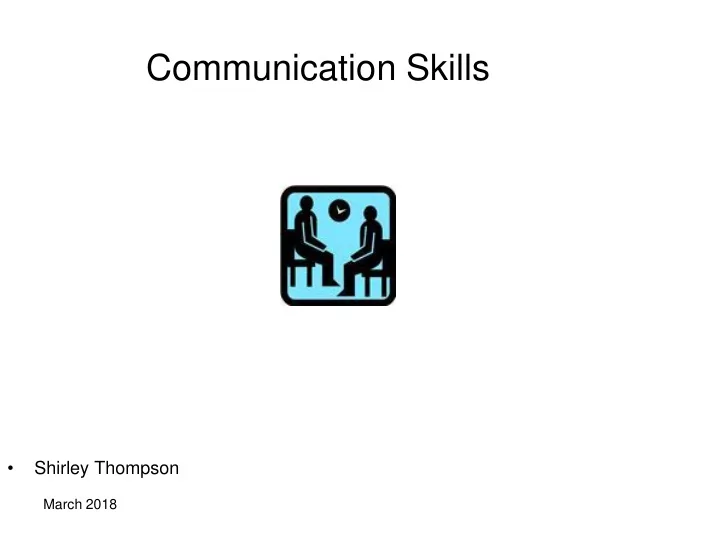

Communication Skills • Shirley Thompson March 2018
Objectives • To explain what facilitative skills are • State what are cues • Why is it important to pick up on cues • Describe blocking behaviours when we communicate • List patients barriers to communication
Communication skills Facilitative skills Are used to: • Gather patient information (Identify patient ’ s history/agenda/needs/concerns) • Acknowledge patient ’ s agenda/concerns • Negotiate decision-making • Give tailored information effectively
Communication Skills Skills Communicates “ I want to know about you” Open questions: “how are you?” “tell me” “ I think you might have concerns Open directive questions: “what’s most important to you or needs and I want to help” right now?” “how did you feel when you heard..?”
Communication Skills Skills Communicates “ I have an idea about how you Educated guesses: “I imagine that news came as may be feeling. Do you want to quite a shock” tell me ” “ I am willing to listen but I can Negotiation: “are you able to say what is see it is hard and I do not want worrying you” to pry” “demonstrates that you have Summarising: been listening” “I would like to check out that I have understood what you have told me”
Communication Skills Skill Communicates “I would like to understand Clarifying: exactly what the problem is” “what were the things about being ill that upset you the most” “ I want you to know I’ve heard Paraphrasing: you and also to check that I've “being ill has been really got it right” distressing” Acknowledging/reflection: “you had a rotten time by the “how you feel matters” sounds of it” “I can see you are upset, it is Ok “you look/sound upset” to tell me about it and I want to help”
Cues “ A verbal or non verbal hint which suggests an underlying • unpleasant emotion and would need clarification from the health provider ” Del Piccolo et al, 2006
CUES
Non-verbal cues • Clear expression of a negative or unpleasant emotion (eg. crying) • Hints to hidden emotions (sighing, silence, frowning, negative body posture)
Types of Cues • Psychological symptoms • Words/phrases which describe physiological distress • Words/phrases suggesting vague or undefined emotions • Verbal hints to hidden concerns • Mention of a life event/repeated or emphasised mention of a neutral event • Mention of a life threatening illness
Blocking Questions Physical Did you have a lot of symptoms Closed Did you tell anyone? Multiple How are you, is the pain any better You’ll feel better in a minute won’t you? leading Defending/justifying I am sure the doctor did not mean to upset you Premature reassurance You will feel better after you have seen the doctor Premature advice You need to Normalising Everyone gets upset when they are ill Minimising It wont be as bad as you think Jollying along Come on you have to stay positive
Blocking behaviours • Overt blocking - Complete change of topic – Pt “ I was upset about being ill ” – Int “ How ’ s your family ” • Distancing strategies - more subtle – Change of time frame - “ Are you upset now? ” – Change of person - “ and was your wife upset? ” – Removal of emotion - “ How long were you ill for? ” Wilkinson 1991; Wilkinson et al 2008; Maguire et al 1996
Professional barriers to communication Fears Beliefs • Unleashing strong emotions • Emotional problems are inevitable and nothing can be done about them • Making things worse • Its not my role to discuss such • Facing difficult questions things • Taking up too much time • There's no point talking about problems that cannot be solved Lack of skills or confidence in Workplace • Starting end of life discussions • Lack of support from colleagues or managers • Exploring concerns • Lack of privacy • Handling difficult questions – saying the ‘right thing’ • Time constraints • Closing the conversation sensitively • Noise/distractions • Nowhere to refer for psychological support • No training or supervision in communication skills
Patient Barriers Environment Skills • Not having privacy Not being able to find the right words • Protecting a relative who is present Do not have sufficient command of the • Not having somebody present who language should be Embarrassing literacy levels Not understanding enough to know how to clarify things Issues of mental capacity Other • Relevant questions were not asked • Patient cues met by distancing
• To communicate well is always a challenge, especially in a busy working environment. What we must remember is that good communications can help a patient and their families to survive their journey through diagnosis and treatment, with better outcomes for all concerned. • The evidence also suggest that if professionals are competent communicators it can increase confidence and prevent burnout.
References • http://www.endoflifecareforadults.nhs.uk/publications/finding-the-words • Maguire, P Booth K., Elliot C., Jones B. (1996). Helping health professionals involved in cancer care acquire key interviewing skills – the impact of workshops . European Journal of Cancer 32A (9):1486-1489. • Del Piccolo L., Goss C. & Bergvik S. (2006). The fourth meeting of the Verona Network on Sequence Analysis. “Consensus finding on the appropriateness of provider responses to patient cues and concerns. Patient Education and Counseling, EACH Pages, 61, 473-475. • Wilkinson S., Perry R., Blanchard K. (2008) Effectiveness of a three day communication skills course in changing nurses communication skills with cancer/ palliative care patients; a randomized controlled trial. Palliative Medicine 22 365-375 • Wilkinson SM (1991). Factors which influence how nurses communicate with cancer patients; Journal of Advanced Nursing 16: 677 -688
Recommend
More recommend